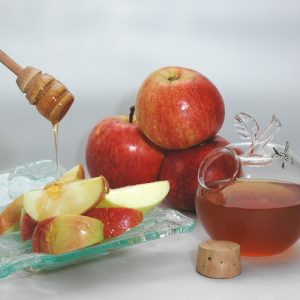×


We have detected your country as:
Please click here to go to the USA website or select another country from the dropdown list.
by: Rev. Rebecca J. Brimmer, International President and CEO

Photo: GPO
The fall holidays, or High Holy Days, begin with the celebration of Rosh HaShanah (the Jewish New Year), which in Hebrew means “head of the year.” It is also known as the Feast of Trumpets and Day of the Blowing (Yom HaTeruah). The shofar (ram’s horn) is blown all over the Land on this day, which marks the beginning of the holiest time of the year on the Jewish calendar. The 10 days between Rosh HaShanah and Yom Kippur (Day of Atonement) are called the 10 Days of Awe. These 10 days are a time of introspection, a time of searching your soul, a time to make everything right between you and your God, as well as your fellow man.
One of my first memories of Rosh HaShanah happened in 1987. My husband Tom and I were preparing to come to Israel. We had applied to be volunteers on a kibbutz, and one of the requirements for acceptance to the program was a recommendation letter from our local rabbi. Since we are Christians, we didn’t have a rabbi. However, in our desire to learn more about our Hebraic roots, we had attended Hebrew classes at the local Reform synagogue. The local rabbi’s daughter had taught the classes. Unfortunately, just a couple of months previously, the rabbi had passed away, and we did not have a relationship with the new rabbi. Still, it was a requirement and we really wanted to be a part of this program.
So, we went to visit the new rabbi and became acquainted, just a week or so before Rosh HaShanah. We didn’t have much time as we were to leave for Israel on a tour in October, and it was already September. After a very short relationship, we asked the new rabbi for a letter of recommendation during the 10 Days of Awe. Because he wanted to keep himself in right relationship under God and his fellow man, and did not want to do anything to hinder this relationship, he very graciously gave us the needed letter. We probably could not have asked at a better time. God was obviously paving the way for us.
Secular New Year’s Day (January 1) celebrations in the West are marked by partying, drinking and merrymaking. In contrast, Rosh HaShanah is a much more solemn time, described by some as subdued joyousness. It begins a season of solemn evaluation and inward scrutiny. The Bible describes the month of Nisan as the first month of the year (usually around April), yet for 2,000 years, the Jewish people have been celebrating their New Year at Rosh HaShanah in the Hebrew month of Tishrei (usually around September).
Why is this? Arthur Waskow, in his book Seasons of Our Joy, describes it as “the month of early fall, of catching our breath after the hot, dry winds of summer. Because it is the seventh month, it echoes the seventh day, the Shabbat of rest and contemplation, of catching our breath after six days of hard work. So perhaps Rosh HaShanah is the new year for renewal. Like Shabbat, it is the time to focus our attention on ultimate spiritual truth. This is then the new year for learning how a human being can turn toward God.”

Photo: Ashernet
I like that thought. As I hear the sounds of the shofar at Rosh HaShanah, I reflect on these thoughts and feel at one with the Jewish people. I find myself examining my heart to see if there is anything I need to correct. Are there relationships that need mending? What is God speaking to me about? What do I need to concentrate on to become the woman God has planned me to be? Many people write New Year’s resolutions on January 1. My experience with these resolutions is that they are quickly forgotten. However, the self-assessment that I make at Rosh HaShanah and in the days leading up to Yom Kippur are more long lasting. It is a special appointment that I look forward to each year.
As with all Jewish holidays, there are special foods eaten on this day, which are symbolic. Sweet foods are eaten, usually apples dipped in honey, to indicate the desire for a sweet year. Round foods are eaten to symbolize the cycle of the year. There is always an abundance of food, indicative of a hope for fruitfulness and prosperity. Fish, cooked with the head still on, is often the main course, symbolizing the head of the year.
I hope that I have whetted your appetite to experience Rosh HaShanah for yourselves. If so, find time to search your heart, make things right with your fellow man, and celebrate with your friends and family. I greet you as my Israeli friends greet each other on this day: “L’shanah tova tichatevu” (May you be inscribed for a good year), a desire for our names to be written in the Book of Life.
Posted on September 29, 2016
Source: (This material was taken from “A Year in the Life of Israel,” contained in the book, Israel and the Church, God’s Road Map.)
All logos and trademarks in this site are property of their respective owner. All other materials are property of Bridges for Peace. Copyright © 2024.
Website Site Design by J-Town Internet Services Ltd. - Based in Jerusalem and Serving the World.